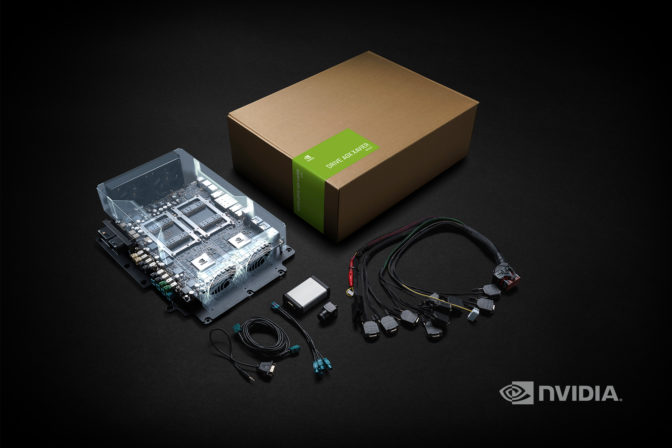At GTC Japan, in the heart of the robotics revolution, we introduced today the NVIDIA DRIVE AGX Xavier Developer Kit, a platform for building autonomous driving systems.
This open, scalable software and hardware solution enables companies to seamlessly develop and test customized autonomous driving technology, streamlining production.
“After several years of working on an autonomous driving computer, the DRIVE AGX Xavier DevKit is now available to order,” said NVIDIA founder and CEO Jensen Huang on stage at GTC Japan. “The development of autonomous vehicles is now turbocharged.”
The devkit includes a DRIVE AGX Xavier car computer, along with a vehicle harness to connect the platform to the car, international power supply, camera sensor and other accessories. NVIDIA DRIVE AGX is part of the NVIDIA AGX platform for autonomous machines, powering robots, medical devices and self-driving cars.
The platform runs the NVIDIA DRIVE Software 1.0 release, which incorporates a wide range of operations necessary for self-driving, including data collection, obstacle and path perception, advanced driver monitoring and in-vehicle visualization. The release includes DriveWorks modules for a sensor abstraction layer, as well as computer vision and image processing libraries that streamline autonomous driving development.
The platform is open, enabling companies to build their own applications on the base software, and constantly enhance it via over-the-air-updates.
DRIVE Software 1.0: Seeing Is Believing
Autonomous vehicles must be able to perceive their surroundings to safely operate without a human driver. To do so, AI-powered self-driving cars must rely on numerous deep neural networks running simultaneously, identifying everything from lane markings and traffic signals to cars and pedestrians.
With DRIVE Software 1.0, the vehicle’s perception capabilities become increasingly sophisticated, zeroing in on and classifying a broad range of obstacles. The DriveNet deep neural network enables the car to detect and classify objects in the surrounding environment and track them from one frame to the next. LaneNet and OpenRoadNet enable the vehicle to identify lane markings and detect driveable space. The software also comes with a data recording tool, which allows manufacturers to collect time-stamped data from various sensors for training, testing and validation purposes.
These advanced software capabilities can also be utilized inside the car. Using a driver-facing camera, applications built on the DRIVE IX SDK can track the driver’s facial expression to know whether they’re drowsy or paying attention to the road. Furthermore, visualization capabilities allow passengers inside the vehicle to see what the car is perceiving, building trust between human and machine.
And it just keeps getting better. DRIVE Software can be updated over the air, constantly improving functionalities and adding new capabilities over time.
A Truly Scalable Computing Platform
The NVIDIA DRIVE AGX Xavier DevKit platform is scalable, enabling manufacturers to streamline development whether on DRIVE AGX Xavier with a single Xavier system-on-a-chip or DRIVE AGX Pegasus, which integrates dual Xavier SoCs and dual next-generation GPUs.
With this flexibility, companies can define the best hardware configuration for their software across the entire autonomous vehicle portfolio — from advanced driver assistance systems to driverless vehicles — all with a single architecture.
Early access customers have been using testing DRIVE AGX Xavier since the beginning of the year. Now, the platform is available to all customers for comprehensive self-driving system development.
To order an NVIDIA DRIVE AGX Xavier DevKit, which will be available Oct. 1, contact us here.

